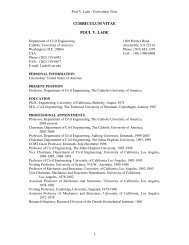Nota Bene-- C:\ARTICLES\TERMIN~1.NB Job 1 - the Catholic ...
Nota Bene-- C:\ARTICLES\TERMIN~1.NB Job 1 - the Catholic ...
Nota Bene-- C:\ARTICLES\TERMIN~1.NB Job 1 - the Catholic ...
Create successful ePaper yourself
Turn your PDF publications into a flip-book with our unique Google optimized e-Paper software.
<strong>the</strong> Christ event. There is a precedent for complementing an ascent into heaven<br />
(α� ναβη' σεται ει�ς το` ν ου� ρανο' ν, 10:6) with a descent into <strong>the</strong> abyss (καταβη' σεται ει�ς τη` ν<br />
α»βυσσον, 10:7) in <strong>the</strong> LXX of Ps 106:26: “They ascended to <strong>the</strong> heavens and<br />
descended to <strong>the</strong> abyss” (α� ναβαι'νουσιν ε« ως τω^ ν ου� ρανω^ ν και` καταβαι'νουσιν ε« ως τω^ ν<br />
α� βυ' σσων).<br />
Fur<strong>the</strong>rmore, a descent into <strong>the</strong> sea is associated with a descent into <strong>the</strong> abyss<br />
in <strong>the</strong> Jonah story. In <strong>the</strong> LXX of Jonah 2:4-7 Jonah says: “You have cast me into <strong>the</strong><br />
depth of <strong>the</strong> heart of <strong>the</strong> sea (θαλα' σσης)...<strong>the</strong> abyss (α»βυσσος) has encircled me...I<br />
have descended (κατε'βην) into <strong>the</strong> earth...” There is an exegetical tradition that relates<br />
Deut 30:13 to Jonah’s descent into <strong>the</strong> sea: “Nor is <strong>the</strong> Law beyond <strong>the</strong> Great Sea, that<br />
one should say: ‘Would that we had one like Jonah <strong>the</strong> prophet who would descend into<br />
<strong>the</strong> depths of <strong>the</strong> Great Sea and bring it up for us, and make us hear <strong>the</strong><br />
commandments that we might do <strong>the</strong>m!’” 34<br />
Paul may or may not be depending upon his audience’s knowledge of such a<br />
Jonah tradition. But at any rate, Paul is asserting that in bringing Christ up from <strong>the</strong><br />
dead, God has supplanted <strong>the</strong> commandment of <strong>the</strong> Law that Israel wanted to be<br />
brought across <strong>the</strong> sea or up from <strong>the</strong> abyss so that "we might do (ποιη' σοµεν) it” (Deut<br />
30:13). In supplanting <strong>the</strong> commandment(s) with Christ, <strong>the</strong> righteousness from faith<br />
(Rom 10:6) has thus brought an end to “doing” as <strong>the</strong> way of attaining righteousness<br />
from <strong>the</strong> Law in accord with Lev 18:5--that <strong>the</strong> person who does (ποιη' σας) <strong>the</strong>se<br />
(commandments of <strong>the</strong> Law) will live by <strong>the</strong>m (Rom 10:5).<br />
After Paul has had <strong>the</strong> righteousness of faith warn Israel what not to say “in your<br />
heart” (ε� ν τη,^ καρδι'α, σου, 10:6), by way of his diatribal style of inquiry he indicates what<br />
<strong>the</strong> righteousness of faith says is already in <strong>the</strong>ir heart: “But what does it (<strong>the</strong><br />
righteousness of faith) say?--‘The word is near you, in your mouth and in your heart (ε� ν<br />
τη,^ καρδι'α, σου),’ that is, <strong>the</strong> word of faith which we are preaching” (10:8). Within <strong>the</strong><br />
scriptural exegesis this reminds <strong>the</strong> audience of Deut 30:14 (LXX): “The word is very<br />
13
















